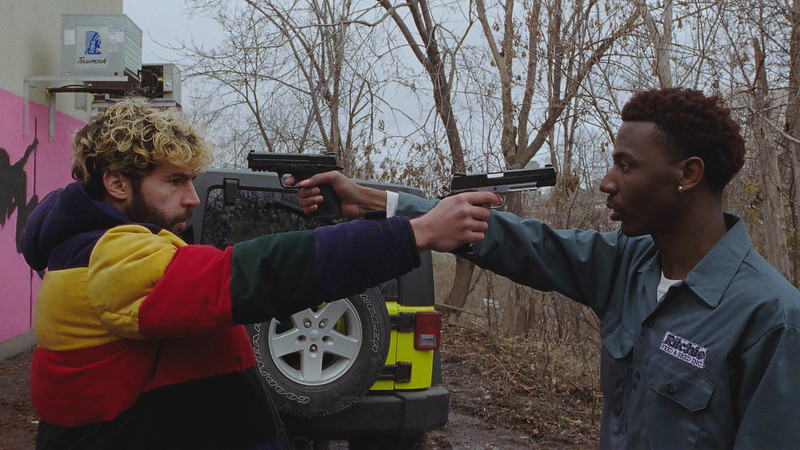Jerrod Carmichael makes his directorial debut at Sundance this weekend with a true marvel of pitch-black comedy, “On the Count of Three.” Given that its main plot-point is suicide, the movie contains a whole set of obstacles a lot of filmmakers spend their careers avoiding. But Carmichael quickly establishes himself as a director you can trust on a wild emotional ride, and a creator of expanding talents with an invigorating approach to entertainment. “On the Count of Three” is the type of risky project that when done right proves a great, fearless storyteller.
The film’s airtight script, by Ari Katcher and Ryan Welch, starts with the central hook of two friends ready to shoot each other—their shared goal is to die by the end of the day. “I think about it all the time,” confesses Val (Carmichael) after Kevin (Christopher Abbott) sees the guns. “It brings me relief.” He’s just broken Kevin out of a psych ward, after Kevin tried to commit suicide with pills days earlier, and Val feels like that means Kevin will do him a solid and die with him. This is the type of darkness that the movie is filled with from start to finish, and Carmichael knows that the audience will always be able to squint and see a heartwarming of two buddies who love each other. He doesn’t overplay either the immense heaviness, or the select bits of light that shine through and give “On the Count of Three” its vital dynamic. Carmichael mastered the opposite balance of heavy and light material with his underrated, thoughtful sitcom “The Jerrod Carmichael Show,” and with his feature debut he shows just how capable he is with tone over 90 minutes.
“On the Count of Three” is propelled by its focused, cause-and-effect plotting—we don’t know what they are going to do with their time, especially after Kevin balks at shooting Val (he just needs a few more hours). Kevin has the idea to kill a doctor who wronged him as a young boy, and Val, being the supportive friend that he is, walks with him right up to the person’s reception desk. Carmichael films the moment in one shot, starting from Val’s Jeep, into the building, up the elevator, and into an office. The shot is more showy for its length than it is its athleticism, but it’s a sharp way to slowly build tension and give us more of their incredible banter, two components that this movie flourishes with all the way to its intense climax. It’s then revealed that Kevin’s target will only be coming in later in the day, giving Kevin and Val a more established timeframe. First they’ll live a little more, then they’ll shoot the doctor, and then they’ll die. Simple as that.
There’s so much to adore about this movie, starting with the chemistry between Abbott and Carmichael. They blend their on-screen energy to create an instantly watchable, hilarious duo, their deep friendship established by the opening images of them amping themselves up to shoot each other in the face. Of the two, Abbott’s highly sensitive Kevin brings more intensity than Carmichael’s muted Val, the duo ebbing and flowing between who wants to die the most but also who is the more irritated. And with Carmichael’s brilliant sense for tone as a director, the story sprints to the darkest places of its ideas on mental health and depression—key subjects that are hardly discussed in the movie, because the guys have hardly verbalized it themselves. And then boom—Carmichael or Abbott hit with some perfectly timed piece of dialogue, based in their characters’ neuroses, and the big laughs give us a time to catch our breath.
Abbott and Carmichael are just two pieces of a uniformly strong cast, although you want more from the supporting people who are brought into the mix. JB Smoove is a scene-stealer in his one sequence as Val’s estranged father, a visit that Val has in mind as part of what to do with his day. Smoove is tough and scary like we’ve never seen before, especially as he hints at an abusive rage toward his son that’s underneath his initial counter of turning their unexpected reunion into a jokey affair. And Tiffany Haddish is excellent as Tasha, Val’s girlfriend, but the limit of her presence is a major flaw in the story’s mechanics. She imparts wisdom into the story in her own way, but her character verges on being one-dimensional, despite being played by a talent like Haddish.
Carmichael nails the larger ambitions for this concept, and keeps the dialogue especially prickly, uncomfortable, but always sincere. Some of the best jokes involve Val’s preoccupation with what’s cheesy or not on his death day, especially as the high-energy events also have him priming himself for his death (Papa Roach’s suicide jingle “Last Resort” gets two hilarious, emotionally meaningful needle-drops). But in the sly, sophisticated tact of Carmichael’s subversive nihilism, here’s a heroically non-cheesy story of a suicide pact, that’s actually about maybe giving life another shot; a death wish saga that is bursting with life, because it dares to reckon with how much darkness and sadness is a part of being alive.












